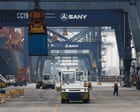
In a week marked by significant developments in trade, technology, and finance, global landscapes are subtly shifting. These changes carry implications for international business relationships, technological progress, and the financial stability of nations.
First, in a noteworthy trade agreement announcement, US President Donald Trump revealed that a trade pact with Indonesia has been successfully negotiated. This agreement entails a notable reduction in the tariff on Indonesian goods entering the United States, now set at 19%, down from a potential 32%. Additionally, Indonesia has agreed to purchase 50 Boeing jets, illustrating a strengthening of economic ties between the two countries. The timeline for the implementation of this deal remains uncertain, but the negotiated terms highlight a progression toward mutually beneficial trade relations.
Simultaneously, advancements in technology also made headlines as Nvidia’s CEO, Jensen Huang, disclosed the company’s approval from the Trump administration to sell its advanced chips to China. These chips, vital for developing artificial intelligence technologies, represent a crucial step in the deepening technological exchanges amidst the US-China trade rivalry. Huang’s announcement in Beijing marks a significant milestone in Nvidia’s ongoing relationship with one of its major markets, indicating a positive outlook for the tech industry’s growth and international collaboration potential.
Turning to the financial scene, the UK’s Financial Conduct Authority (FCA) has imposed a fine of £42m on Barclays Bank. This penalty comes due to the bank’s inadequate management of money laundering risks associated with two businesses, Stunt & Co and WealthTek. The FCA’s sanctions included £39.3m directly linked to dealings with Stunt & Co. This action underscores the ongoing vigilance required in the financial sector to prevent illegal financial activities and to bolster the integrity of banking operations worldwide.
In a related financial development, the unexpected rise in UK inflation rate to 3.6% in June has drawn attention. Analysts suggest that this increase may compel the Bank of England to maintain its current interest rates longer than anticipated. As the cost of living crisis persists, with consumers feeling the squeeze, economic policymakers are keenly observing the situation. The Office for National Statistics reports suggest that such inflationary pressures could influence financial decisions and impact consumer sentiment.
In summary, these recent developments in trade, technology, and finance have illuminated both challenges and opportunities on a global scale. The collaborative trade agreements, technological advancements, and financial oversight efforts paint a positive picture of international cooperation and economic resilience. These activities hint at an ever-evolving landscape where nations and corporations navigate complex interdependencies, promoting growth while managing risks. With mindful governance and strategic initiatives, there lies a promising path forward for harmonious global progress.
Source: {link}
